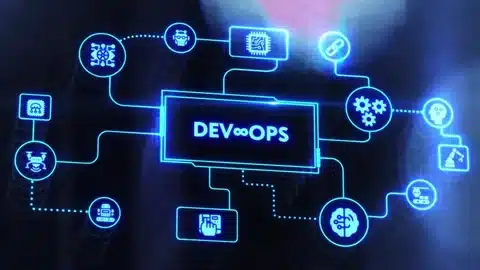DevOps vs Software Engineer: Which One to Choose
Based on the differences and complementary roles of DevOps engineers and software engineers, this article will help businesses understand which expertise to prioritize based on their specific needs, including their project requirements, team dynamics, and operational goals.
The blog highlights:
- who are DevOps and software developers
- what do we have in common
- comparison of DevOps and software engineers
- guide in choosing the suitable expertise

Table of Contents
The article highlights the differences in the roles and focus areas of DevOps and software engineers, while also showcasing the things they have in common. The key distinction lies in their objectives. While DevOps engineers aim to ensure seamless collaboration between development and operations, constant delivery, automated processes, and infrastructure management, software developers are primarily focused on designing, coding and building applications.
Hence, businesses looking to streamline operations, improve collaboration, and scale efficiently would benefit from hiring DevOps engineers. On the other hand, companies that need custom applications, feature development, or specialized software solutions would require the expertise of software engineers.
Table of Contents
What is a DevOps Engineer
A DevOps Engineer is an IT professional specialising in installing both development (Dev) and operations (Ops) teams to achieve flawless collaboration.
DevOps is an approach in software development that involves various tools, practices, and mentalities, all of which are aimed at simplifying the Software Development Lifecycle (SDLC), which enhances the speed of application delivery. The wide range of such methods helps DevOps engineers excel in collaboration, efficiency, and constant improvement, especially regarding customer service and market dynamics.
DevOps was initially developed and introduced in 2007-2009 as a way to mediate conflicts between development and operations teams. This methodology proved to be indispensable when it came to improving collaboration, simplifying workflows, and establishing automated processes, – all of which resulted in more reliable software development and deployment.
Although developers and IT/Ops professionals once had different and sometimes conflicting objectives, separate management, and misaligned performance indicators, today teams more often align their efforts to achieve better results.
Working with DevOps introduced multiple benefits to software development:
- Swift delivery
Achieved by automating the software release processes, it allows for a faster launch of features and fixes, quicker responses to customer needs, and obtaining a market lead. - Quality application updates and changes in infrastructure
DevOps’ practices guarantee both reliable delivery with enhanced pace and seamless user experience. - Scalable infrastructure and development management
What automation and consistency do at scale is help in managing complex or changing systems, with high efficiency and minimized risk. - Scalability and Flexibility
Scalable architectures offered by DevOps improve the ability to scale and adjust for handling workloads and project changes. - Reduced Costs
Due to decreased manual labor, limited errors, and improved resource utilization, one is entitled to expect minimized expenses when utilizing DevOps practices.
What is a Software Engineer
A software engineer, on the other hand, is a professional who is responsible for designing, developing, testing, and maintaining software applications/systems. Software engineering has been an established branch of engineering since the 1960s, long before DevOps engineering came into play.
Software developers create solutions that comply with established user or business requirements by utilizing engineering, computer science, and programming guidelines. They are essentially problem solvers by trade, and they specialize in building a vast range of applications – from mobile apps and web platforms to enterprise systems and installed software.
The software engineers do to help the development team perform effectively is:
- Create algorithm development tailored to business requirements.
They can design a targeted algorithm to meet diverse requests: from recommendation engines to financial modeling and machine learning applications. - Perform advanced debugging and solve issues.
This feature helps teams detect and manage code errors with maximum productivity, as well as leads to a range of benefits: enhanced reliability, minimized downtime, and error-free applications. - Design system architecture.
Scalable and modular architectures, created by software developers, make it possible for systems to evolve along with business needs without disruptions. Their set of skills helps prevent bottlenecks, which in turn provides productive working processes, as well as the groundwork from which further installed features can grow.
Software and DevOps Engineers Similarities
Despite the core differences between DevOps and software engineers, they share features that are vital for harmonious collaboration between the two roles, which provides productive development and deployment. Here are the key aspects:
- Collaboration in the SDLC is reached through both teams working to build, test, and deploy software effectively.
- Focus on quality in software development consists of two elements: flawless and efficient code on the software engineers’ side as well as smooth deployment and operational stability from the DevOps engineers’ viewpoint.
- Problem-solving is achieved with the analytical thinking and problem-solving skills of both specialists.
- Collaboration across teams is ensured since software and DevOps engineers work in cross-functional environments (quality assurance, product managers, and operations) to ensure that technical outputs match business needs.
- Use of automation is a priority of both teams, obtained with various tools, although DevOps engineers are more inclined to emphasize infrastructure and pipeline automation.
Differences between DevOps Engineer vs. Software Engineer
Central Focus Areas
The role of a DevOps engineer primarily revolves around optimizing the process of software delivery, which encompasses providing swift, reliable, and smooth deployment. The role is realized through several points, namely workflow automation, infrastructure maintenance, as well as development and operations alignment. The major focus is placed on improving the overall efficiency of the SDLC through harmonizing development and operations.
Meanwhile, the job of a software engineer, centers on creating high-quality, scalable, and maintainable software. As professionals, software developers ensure that software aligns with set requirements through designing, coding, testing, and debugging applications. Their team’s ultimate goal is to create functional, productive, and reliable software solutions.
Tasks and Responsibilities
The fundamental responsibilities of a DevOps engineer comprise:
- Software delivery pipeline automation and optimization, achieved by using CI/CD processes.
- Infrastructure-as-code management and system health/performance supervision.
- Development teams seamless collaboration establishment.
- Safety controls and compliance measures implementation, which occurs during the deployment phase.
- Problem-solving & troubleshooting in production environments.
On the flip side, a software engineer focuses on:
- Software applications design and development, tailored to specific requirements.
- Code creation through programming language usage to achieve its efficiency, quality, and longevity.
- Code testing and debugging for further guarantee of software quality/functionality.
- Software design and development processes documentation, used for future reference.
- Software maintenance and updates conducted during all its stages.
This comparison of DevOps vs software engineer roles highlights how software engineers focus on coding and application functionality, while DevOps engineers handle various environments and processes that are required for efficient software deployment and maintenance.
Work Scope and Domains
The work outline of a DevOps engineer encompasses the entire SDLC and could even surpass it. Their tasks involve:
- Software monitoring and managing, which includes supervising the entire process of software creation: from development and testing to deployment and operations.
- Scalability and performance enhancement achieved by infrastructure optimization.
- In-production application supervision and further issue identification & management.
- Teamwork establishment: ensuring collaboration between development, operations, and security teams.
In contrast, the work scope of a software engineer is less general, primarily pinned to the development phase of the SDLC, which includes such tasks as:
- Software applications design and coding.
- Functionality and performance guarantee, achieved through testing and debugging.
- Software maintenance and updates when necessary.
The core difference between DevOps and software engineers in this aspect lies in the range of involvement: while DevOps Engineers are engaged in processes from development to deployment and current operations, software developers are expected to design and maintain apps.
Skill Set Requirements
A DevOps engineer’s skill base is supposed to include vast knowledge regarding such aspects as development and operations, focusing primarily on automation, infrastructure, and collaboration. Here is a comprehensive list of necessary competencies:
- Expertise in utilizing continuous integration and continuous delivery tools like Jenkins, Travis CI, or GitLab to ensure continuous integration and delivery pipelines.
- Experience with such cloud platforms as AWS, Azure, or Google Cloud to manage cloud-based infrastructure.
- Competence in using automation scripts, that feature languages like Python, Bash, or PowerShell.
- Comprehensive understanding of server configurations, system operations, and network security protocols.
- Proficiency in using tools like Docker for packaging applications into containers and Kubernetes for managing and coordinating them.
- Strong collaboration skills to ensure coordination between development, operations, and security teams.
On the other hand, the skillset of a software engineer is all about coding, design, and application development. The most crucial assets embrace the following:
- Expertise in programming with languages like Java, Python, C++, or JavaScript.
- Competence with development methodologies, such as Agile or Scrum, for software development lifecycle management.
- Proficiency in code change monitoring and management tools (e.g. Git).
- Profound architecture knowledge: design patterns, algorithms, and data structures to ensure scalability and longevity of the applications.
- Experience with debugging tools and testing frameworks to ensure code quality.
Approaches And Methods
DevOps engineers’ approach is characterized by a strong emphasis on automation, collaboration, and continuous delivery. Their primary task is making software development and deployment seamless and smooth, so the following methods and procedures are preferred:
- Continuous Delivery as a way to ensure automation of building, testing, and deployment processes, and constant availability of code that is ready for deployment and matches established quality requirements.
- Infrastructure as Code (IaC), which allows for code use to guarantee scalable, automated, and consistent infrastructure management, while also utilizing various software development techniques like version control and continuous integration.
- Microservices architecture as a means of ensuring that built applications are independent, task-oriented services that communicate through APIs, it is responsible for flexibility, scalability, and technology diversity.
- Monitoring and Logging to maintain constant service reliability through metrics and logs analysis, which helps to detect performance issues, estimate user impact, and enable early issue intervention.
- Communication and Collaboration across teams, enhanced through utilizing tools, automation, and shared workflows, to make certain that organizational goals match, and improve project delivery.
On the other hand, software engineers are trained to put code creation and iteration within a structured development environment first, which is mirrored in the approaches they choose, in particular:
- Agile Development, gained through working in repeated cycles, in which applications are built, tested, and constantly improved to meet user requirements.
- Focused Development, introduced by putting emphasis on creating clean, efficient, and maintainable code for software applications.
- Component-Based Design as a way of designing software through using independent modules to make the application architecture easier to scale and maintain.
- Testing-Driven Development, which encompasses unit tests, integration tests, and other testing frameworks to guarantee reliable applications.
- Sequential Workflow, represented by a defined structure that involves planning, coding, testing, and deployment stages, while keeping automation secondary.
Roles in SDLC
The role of DevOps engineers throughout the Software Development Life Cycle (SDLC) is diverse and multidisciplinary, as it revolves around implementing development and operations processes for swift and seamless delivery. The key aspects representing their role are as follows:
- All-encompassing involvement gained as DevOps engineers engage in all SDLC stages, from planning to maintenance, to provide continuous integration, delivery, and deployment.
- Automation as a means for simplifying software development processes (testing, deployment, and infrastructure management) in order to minimize human involvement and delays.
- Collaboration between development and operations teams, to ensure shared accountability for code performance and consistency.
- Monitoring and optimization through using various tools to keep track of applications after deployment, which makes it possible to identify & resolve issues when required.
The role of software developers is less holistic, compared to DevOps engineers, and is concerned with specific phases of the SDLC, with a strong emphasis on creating and refining the software. More specifically, the priorities enlist:
- Development-centric: specifically placed on planning, coding, testing, and debugging software to match set project requirements.
- Code creation: designing algorithms and writing code for software applications, which is frequently performed during the development stage.
- Thorough testing and debugging before deployment as a means to provide functionality and reliability.
- Transfer to DevOps/operations teams as a sign of successful development of the software and its readiness for deployment and maintenance.
What Should You Choose for Your Project Development: DevOps or Software Engineer
This section introduces a checklist to guide you in identifying and selecting the type of specialist your business needs.
When Should You Choose DevOps Engineering
There are a number of scenarios where adding DevOps engineers to your team would greatly improve its capabilities and working process, that you might consider before making the decision:
- Speed and Efficiency as Priorities
For organizations requiring faster software delivery to remain competitive, DevOps engineers optimize workflows using CI/CD pipelines, which results in automated updates. - Complex systems or Cloud Migration
Best-suiting for enterprises with large-scale operations or transitioning to cloud-native and microservices architectures, DevOps provides scalability and consistency through infrastructure-as-code practices (e.g. with tools like Kubernetes and platforms such as AWS). - Communication Gaps
Should development and operations teams operate in silos, DevOps bridges the gap by promoting teamwork and shared responsibility; this entails enhanced communication and workflow efficiency. - Manual Workflows or Downtime Issues
Frequent system failures or reliance on manual processes can hinder progress. DevOps engineers address such challenges by automating testing, deployment, and monitoring to boost reliability, reduce errors, and minimize downtime. - Need for Regulatory Compliance
DevOps is preferred in industries with stringent regulations: finance and healthcare included. By integrating policy-as-code into CI/CD pipelines, businesses adhere to standards like GDPR, HIPAA, and PCI DSS. - Digital Transformation Initiatives
For organizations modernizing their technology stack or adopting agile methodologies, DevOps helps align strategies, fostering scalable, innovative, and efficient workflows.
When Should You Choose Software Engineering
To determine if incorporating software engineering into your team is the right choice, reflect on situations where software engineers are vital for driving your business forward. Those encompass the following:
- Custom Software Development
When businesses need unique solutions like proprietary applications, customer portals, or internal systems, software developers design and deliver software tailored to specific objectives and goals. - New Product Development
Bringing new products or features to market often requires the expertise of software developers. They turn concepts into reality, leveraging their skills in programming, architecture, and algorithms to build MVPs or refine existing software. - Algorithm-Intensive Projects
Software engineers apply their irreplaceable knowledge of data-driven development and problem-solving to create effective solutions in cases involving AI, machine learning, or complex computation. - Optimizing Performance
Whether it is optimizing legacy systems, debugging, or improving software scalability and reliability, software developers are key to boosting performance. They also specialize in crafting user-focused applications like mobile apps and e-commerce platforms. - Long-term Software Maintenance
Businesses focused on maintaining existing software will benefit from software engineers’ approach which effectively handles ongoing updates, ensures long-term reliability, and streamlines development for applications, SaaS platforms, or ERP systems.
As illustrated, the core difference between DevOps vs software engineers is how they are to be engaged in a project. DevOps is required in scenarios calling for faster software delivery, scalability, improved collaboration, and automation; on the contrary, a software engineer would contribute more to environments where the priorities involve custom software development, new product creation, algorithm-intensive projects, performance optimization, and long-term software maintenance.
Software Developer vs DevOps Engineer Q&A
While DevOps and software engineering are closely linked, they are essentially not the same. Software engineering revolves around designing, coding, testing, and maintaining software, whereas DevOps is about integrating development and operations to automate workflows, manage infrastructure, and guarantee efficient deployment and further supervision. To put it simply, DevOps complements software engineering, particularly by simplifying the SDLC to achieve faster and more reliable results.
The way both roles contribute to security aligns with their responsibilities. DevOps engineers are to ensure that:
- CI/CD pipelines are embedded with automated security checks
- infrastructure configurations are secure by using Infrastructure as Code (IaC)
- threat detection and response are performed proactively via monitoring tools
On the other hand, software engineers provide security through:
- safe coding practices
- input validation
- encryption
- rigorous code reviews.
As a result, they protect the software and its supporting infrastructure at every stage of the SDLC.
The two roles both involve skills like programming and scripting, so a DevOps engineer can technically work as a software engineer.
However, a DevOps engineer's central focus is automation and infrastructure, while a software engineer is responsible for coding, design, and testing. Therefore, switching from one role to another demands gaining advanced knowledge about software development.
An organization’s expansion goes side by side with basic automation tasks evolving into handling intricate infrastructure, using tools like Kubernetes to scale systems, and installing high-level security and compliance measures. DevOps engineers adapt to an advanced IT environment by providing efficiency: improving performance for increased traffic, ensuring that cross-team workflows match, and adjusting accordingly to new technologies and processes.




